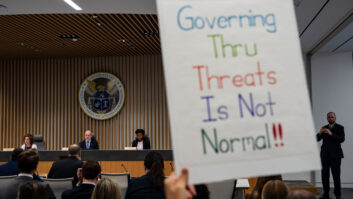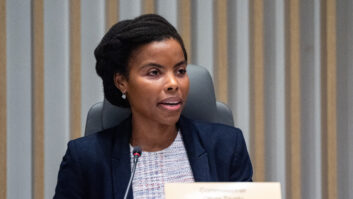
When our industry first heard about proposed cutbacks in FCC field offices, the Society of Broadcast Engineers called the idea “draconian.” The commission plan later was modified in a compromise that SBE hailed, though it said the result was not completely satisfactory.
Radio World followed up with SBE President Joe Snelson, CPBE, 8-VSB, to ask about the impact of the final outcome.
RW: What is SBE’s reaction to the FCC’s actions in final form?
Snelson: While better than the original plan of closing two-thirds of the field offices and eliminating half of the field staff, the compromise plan developed by Congress and the FCC still leaves wide areas of the country without a local commission enforcement presence. The FCC has never had enough enforcement personnel available to deal with every instance of pirate radio, malicious interference and illegally operated, unlicensed RF devices in any market. Instead, the effectiveness of the FCC enforcement program has always been dependent on the level of deterrence created by the actions of the commission. Deterrence is in turn based on timely, visible responses to enforcement problems in a given area.
RW: Commissioners Pai and O’Rielly have referred to frayed relationships and poor communications between headquarters and agents in the field. Has SBE seen evidence of this, and how has it affected broadcasters if so?
Snelson: We are concerned that there is a disconnect between the tenured and very professional field office staff and the commission staff in Washington. Information that SBE has is that the field offices are overworked and understaffed to the point that there is time only to address critical, safety-of-life cases in the field. Yet, a statement from the Enforcement Bureau front office said to the effect that the field offices have “too little to do” and that therefore reducing the number of offices and staff was a reasonable cost-saving measure. The fault could be placed on the consulting firm that conducted the study of the field offices, but we can’t know that because the consulting firm’s study, and the conclusions that the firm drew, were never made public.
RW: What is your comment on the FCC’s decision to require that field agents be electrical engineers?
Snelson: Any program that will bring more engineers to the commission is beneficial. However, at the field offices in (as but two examples) Detroit and Philadelphia there are tenured, competent staff members who are not EEs who stand to lose their jobs by this unfortunate FCC reorganization. Losing their knowledge base, their professionalism and their close relationships with the industry is a mistake and it should not have been allowed to happen.
RW: A widespread concern among broadcasters about all this has been the impact on pirate radio enforcement. But in certain markets, pirate stations seem to be almost a runaway problem regardless of the size of the FCC presence. Is there any reason to think this is going to get better, not worse, regardless of FCC action?
Snelson: As I mentioned earlier, the key to pirate broadcasting is to create deterrence. The FCC hasn’t enough staff to visit every pirate broadcasting station, seize equipment and issue large monetary forfeitures to each one. However, timely, visible and regular enforcement actions with respect to a few, with meaningful sanctions will, over time, create a sense of deterrence and the situation will improve. Recently, FCC Chairman Wheeler said that on his watch there had been approximately 200 enforcement actions against pirate broadcasters. That was news to SBE. There was virtually no publicity attached to those actions and the potential deterrence value of any of them, individually or in the aggregate, was therefore nil.
RW: SBE’s General Counsel Chris Imlay was scheduled to testify to a congressional subcommittee about this topic, but the hearing didn’t happen. What would Chris Imlay want Congress to know, at this point?
Snelson: Essentially that there are three major spectrum enforcement issues in broadcasting: (1) unlicensed users of broadcast and broadcast auxiliary spectrum; (2) malicious interference in certain areas (such as New York) relative to the use of broadcast auxiliary spectrum; and (3) a worsening ambient RF environment, most notably in the AM broadcast band. Issues 1 and 2 can be addressed through a few timely, visible enforcement actions. Issue 3, which is a complete bar to any AM revitalization effort unless remedied, is a longer-term issue. To address it, enforcement actions against power utilities which refuse to clean up overhead power line interference, and against importers and retailers of RF lighting devices that make broadcast reception, and especially AM broadcast reception, impossible throughout entire communities. Closing field offices will not help in resolving issues in any in any of these three areas.
RW: SBE has lamented the loss of skills and knowledge of “some very good career engineers in the field offices,” and you criticized the FCC process for a lack of “transparency and public responsiveness.” With the final plan now out, what could or should be done about either of these problems?
Snelson: The lack of transparency of this process was the most discouraging aspect of it. The FCC asserted that the important stakeholders had been contacted by their contractor before its recommendations were made. No one ever contacted the SBE. And the contractor’s report that purportedly was the basis for the office closing plan was never made public.
As to the loss of the capable, tenured staff in the field offices, there is little that can be done about this now that the FCC order has been issued. The planning for redeploying field office staff was, in SBE’s view, ill-conceived.
RW: What else should radio engineers and managers know about this issue right now, and what would you want them to do about it?
Snelson: Engineers and managers may be tempted to hail the Enforcement Bureau restructuring as a benefit because of the decreased likelihood of random broadcast station inspections. Indeed, the field offices were forced for a time to conduct activities that were unrelated to the core function of preventing and resolving interference and protecting a renewable natural resource. But spectrum enforcement is a critical function of FCC field office staff, and the result of this restructuring will, over time, be a marked decrease in enforcement capability and, we fear, a marked deterioration in the RF environment in which we conduct our business.







